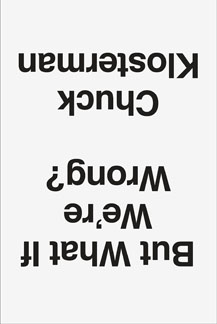With a mix of his own ideas and the spotlighting of others’, Chuck Klosterman’s ninth book, “But What If We’re Wrong” (2016), had me wanting to discuss these ideas with someone after each chapter. Like all of his works – but on steroids this time – this one is utterly engaging (except for one baffling misstep, which I’ll break down below).
Subtitled “Thinking About the Present As If It Were the Past,” Klosterman challenges himself and the reader to realize that our predictions about the future will be wrong because we are too heavily influenced by the present. Examining how past prognosticators mis-predicted our modern age, he thinks about what author will ultimately be regarded as the elite of the early 21st century (“A Quaint and Curious Volume of [Destined-to-Be] Forgotten Lore”), what musician will come to define rock and roll (“But That’s the Way I Like It, Baby. I Don’t Want to Live Forever”), and what TV show will be seen as the most realistic portrayal of life during the age of TV (“Don’t Tell Me What Happens. I’m Recording It”). Klosterman seeks singular answers, seeing as how that’s how we currently view the past – for example, Shakespeare is seen as the preeminent playwright of the early days of the stage, and Sousa is regarded as the premiere composer of marches.
He notes that these arguments have nothing to do with the “merit” of the candidates, they are educated guesses about what future societies will collectively think. The quirky thing, as he notes multiple times, is that for an author or musician or TV show to rise to the level of headlining discussions in the future, they have to be cared about by people who don’t care about books, music or TV – just as today’s most disengaged person knows Shakespeare, Sousa, Frank Lloyd Wright and “Citizen Kane.”
It’s a pleasure following these chapters to their conclusions, where he gives his predictions, because it’s not just about following his argument, it’s also about following his argument about the proper way to make the argument – which is stated in the subtitle, or to put it another way: to think about the future as if it was the present.
The really mindblowing installments are on the theory that there’s more to gravity than we currently believe, thanks to the revelations of quantum physics (“Burn Thy Witches”), and simulation theory (“The World That Is Not There”). These aren’t Klosterman’s ideas (indeed, he interviews experts specifically for this book), but he beautifully presents them, and before long, I was convinced that we as humans will eventually have a different conception of gravity. And he makes it hard to argue against the idea that we are simulated people in a simulated reality, noting that 1) computers keep getting better, 2) we can already create simulations, which keep getting better, and 3) there’s no reason to believe either of these things will change.
Whereas Klosterman’s argument from an earlier book that there’s a 50-50 chance of everything (either it happens or it doesn’t) is just for laughs (the author calls it an “absurdist joke”), his case that reality isn’t real is comparatively airtight.

I also adored the chapter on the future of football (“Sudden Death [Over Time]”), as it’s a pet conversation starter of mine, specifically the question of how the public will react when an NFL player inevitably dies on the field after a violent collision. Klosterman effectively chastises me and other like-minded thinkers for thinking football will disappear. While admitting that football’s popularity inevitably has to drop at some point, he makes a wise case that the sport will continue in some form, with an entrenched, passionate – albeit smaller — fanbase.
And then – cue record scratch — there’s the chapter on politics.
For such a smart man writing such a smart book, “The Case Against Freedom” lands with a thud. Klosterman asks whether a political setup that values freedom and democracy is perhaps not the best system, even though the common modern view is that it is. This question is flawed from the start because he doesn’t say whether he’s talking about the best system from the perspective of the government, the people as a collective group (or the “average person”), or the people as individuals. Also, freedom and democracy aren’t the same thing; democratic rulings often run counter to the principles of individual liberty.
Granted, I have different political views from Klosterman. I’m a purist libertarian; he is – by my best guess — a left-leaning statist. I’m not particularly disappointed by that; as someone who holds extreme minority views, I’m accustomed to discovering that my heroes in the arts and entertainment world aren’t in lockstep with me. Rather, I’m disappointed in the haphazardness and sometimes outright emptiness of his arguments in this chapter.
As the essay continues, he’s off base about details. Reflecting on the 2000 election, he notes that he “naively viewed (Bush and Gore) as transposable,” suggesting that all the bad things about Bush’s presidency (presumably, the Middle East wars and the erosion of freedoms) would not have happened under Gore. But the facts show they were indeed transposable. Gore had a consistent record of supporting wars, he’s married to a famous censorship advocate (and has never expressed disagreement with his wife’s views), and there’s nothing to suggest that he would’ve presided over the country differently than how Bush did. (Sure, he MIGHT have, in the sense that we can’t know an alternate reality, but Klosterman offers no evidence to support that argument.)
Klosterman surmises that “Reagan will be defined as an objectively bad president.” He dislikes Reagan for different primary reasons that me – Klosterman cites deregulation of businesses leading to a wealth gap, I’d cite that he was the first of the enthusiastically pro-debt presidents (a string that’s now at six, with Trump). Klosterman and I agree that the U.S. will collapse (that’s not a bold prediction, if someone gives a cursory glance at history), but I think he whiffs on an obvious candidate for WHY it will collapse.
Reading between the lines – the only way to make a stab at unpacking this chapter — I suspect Klosterman does not rank the debt as a major issue. He counts the fiscally responsible Grover Cleveland as the ultimate in mediocrity, and he has nothing but good things to say about Obama. I think the debt is very likely to play a major role in the collapse of the U.S., and as such Klosterman will be right that historians will see Reagan as a bad president, but for the wrong reason.
The weirdest misstep comes when Klosterman delves into freedom of speech and laughably claims that “If the expression doesn’t involve national security, the government generally doesn’t give a shit.” (Amazingly, he later says he watched and liked “citizenfour,” a movie that chronicled Snowden’s revelation that the government was spying on absolutely everyone.) He goes on to argue that having a First Amendment (you can’t be punished by the government for your speech) combined with a marketplace of ideas (your speech can be criticized by other free speakers) is perhaps functionally equivalent to the European structure where you CAN be imprisoned for speech if the government doesn’t it, like but where your speech isn’t usually criticized by other free speakers.
At this point, I began to get the impression that Klosterman conflates laws with reality. He doesn’t consider the bad consequences of laws (people being imprisoned for speaking, a “crime” with no victim). His premise seems to be this: The fact that there are laws in some countries against speech the government doesn’t like means that no one in those countries says anything the government doesn’t like. My impression was validated when the author notes that “The Second Amendment is antiquated,” adding a footnote that “This is obviously true.” In terms of structuring a debate, this is weak, since he offers no argument as to why the Second Amendment is antiquated. But additionally, I suspect his premise is that if the Second Amendment were repealed, people would simply not have guns, following his earlier suggestion that if there is a law against anti-government speech, people won’t engage in anti-government speech. The author does not seem to consider that guns would become a black market like drugs, and that many additional harmless people would become classified as criminals and locked up.
Klosterman gets one thing absolutely correct in “The Case Against Freedom”: Contrasting common wisdom, he notes the mathematically reality your vote won’t affect the outcome of an election, then he channels George Carlin and points out that people who don’t vote DO have a right to complain, as they did nothing to cause or to validate the election’s outcome. (This is a case where a widely held belief is demonstrably wrong, although overall that’s not the point of “But What If We’re Wrong.” Klosterman is generally not interested in the easy targets.)
He concludes the essay by saying that Obama is the greatest president of his lifetime, essentially because he was black and didn’t literally poop his pants when speaking to the public. But Obama did many things that furthered the Bush-era trends of the U.S. moving further away from the principles of freedom and democracy – notions that Klosterman reiterates he DOES believe in.
Obama bombed more innocent people to death than any previous commander-in-chief, he oversaw (and often encouraged) the piling on of more debt, and the U.S. stayed atop the charts as the country that incarcerates the highest percentage of its population (driven largely by the federal drug war, which for a time, Obama pursued even in states that had relaxed the fight). The spy state proliferated, he made a successful legal argument that the president has the right to kill Americans without due process (in the FISA courts that also signed off on the mass spying), and he made executive orders commonplace before handing those powers to Trump, who is the ultimate test case for why the president shouldn’t have so much power.
In short, Klosterman professes to favor freedom and democracy, then notes that his favorite president is one who consistently undercut those principles.
What’s worse, Klosterman misses opportunities to explore specific political issues that would’ve fit more snugly into this book’s premise. For example, we’ve collectively accepted that state-sanctioned violence (i.e. the drone-bombing program) should not be equated with citizen violence (i.e. a citizen murdering another citizen). Despite showing awareness that state violence is bad (he correctly notes that citizens killed by police officers is a serious problem, although he’s caught up in the race of the victims rather than the fact of the killings), Klosterman misses a chance to ask: What if people in the future decide state violence should be treated the same as citizen violence? How would the world operate differently if that was the widespread belief? Another fun angle might’ve been: What if debt actually turns out to NOT destroy the U.S.? What if it goes on for several centuries, and people begin to think debt is not only not a bad thing, but that a debt-based world economy is entirely normal?
“The Case Against Freedom” is a very odd misstep that proves my original belief wrong: that every chapter in this book would be great. Ten strong chapters out of 11 ain’t bad, though. “But What If We’re Wrong” is a daring concept, deliciously delivered, and it will make me pause any time I start to think I definitively know something about how the world works.

